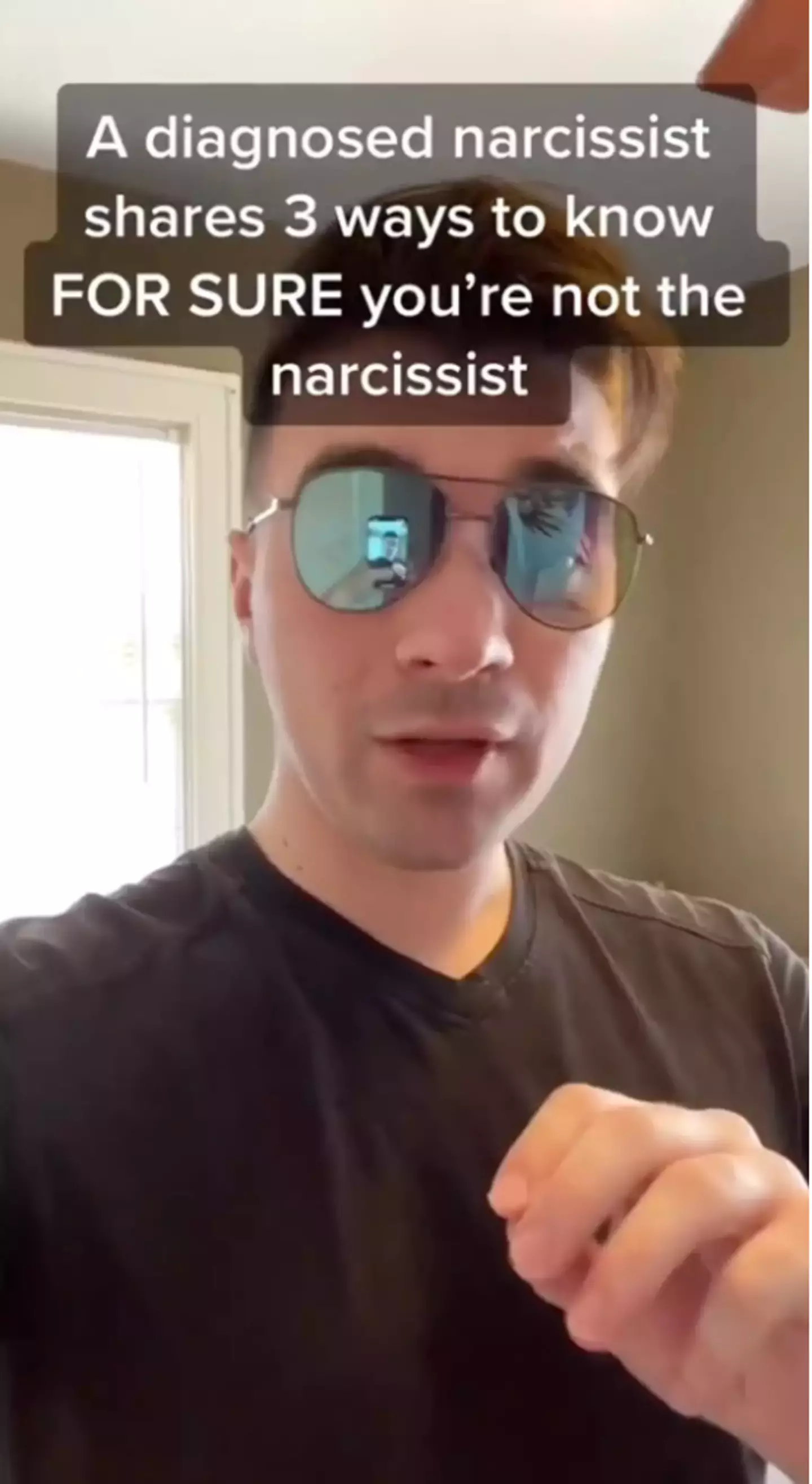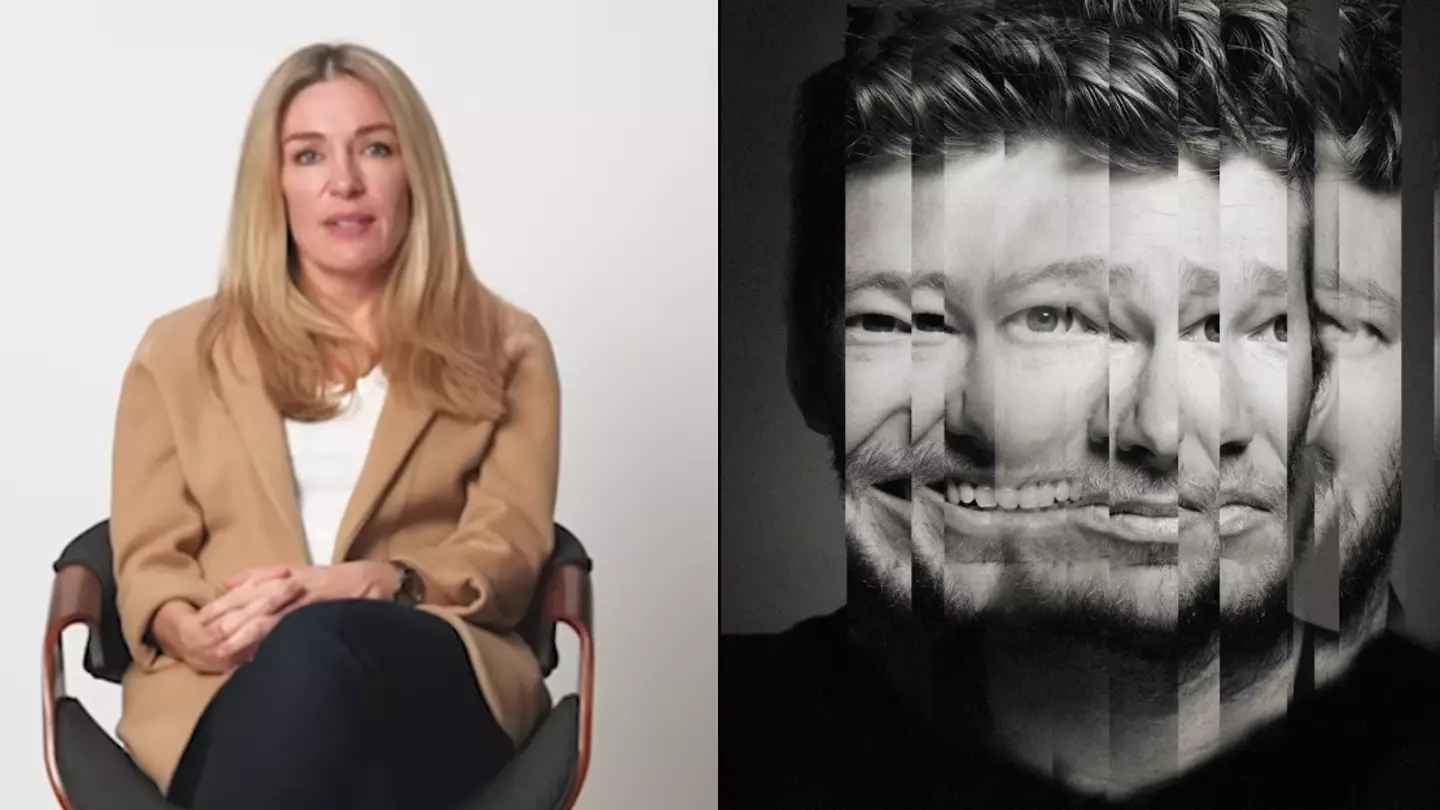A diagnosed narcissist has laid out three key ways
you can tell that you aren't one as he opens up about what it's like
living with the condition.
There is much fascination about people
whose brains work differently and the perspective they have on the
world, and as such there has been a lot of interest in the subject.
Experts have come up with questions they say a narcissist couldn't answer honestly, as well as the things they do that will never make sense to other people.
Advert
But first things first, it might be helpful to work out what being a 'narcissist' actually means.

(@the.nameless.narcissist/Instagram)
What is a narcissist?
A narcissist is someone who has narcissistic personality disorder (NPD), which results in a person having an incredibly high sense of self-importance.NPD is defined as a mental illness and is generally associated with a 'pervasive pattern of grandiosity, need for admiration and lack of empathy', according to the Diagnostic and Statistical Manual of Mental Disorders (DSM-V).
Advert
One of the best windows into what a narcissist is comes from a narcissist themselves.
Jacob Skidmore got diagnosed with NPD and has set about the task of explaining what it's actually like as he satisfies people's curiosity over life as a narcissist.


Being diagnosed with NPD, Jacob Skidmore can properly explain the perspective of a narcissist (Instagram/@the.nameless.narcissist)
What has Jacob Skidmore said about narcissism?
Jacob previously opened up to LADbible about living with narcissism and how it affects him.Advert
He said: "Nowadays I’m (obviously) very open about my condition but, since I was aware of the opinion most people had about it, I didn’t tell anyone for around two years.
"I know some people with NPD that have gone decades without disclosing it out of fear of judgement. That’s the issue with having such a shame driven disorder.
"It’s hard to tell anyone something that you think they’ll judge you for.
"Whenever I attempt to be vulnerable with my friends it’s like the shame catches the words in my throat and I psychically can’t say it.
"It’s a palpable terror at the idea of something thinking anything bad about me."
Advert
Speaking about how you could tell if you weren't a narcissist, Jacob previously made a video where he explained three main signs you could use to tell you didn't have NPD.
Jacob explained that he'd never met a narcissist who didn't 'do these things', though stressed that if you didn't think the signs applied to you it didn't mean you weren't a narcissist.
"Do you feel like your emotions are genuine?"
This was his first question for people if they wanted to know they weren't a narcissist."Because for me, whether it comes to a funeral or my friend going through a breakup or it comes to me being happy for somebody's achievement, I'm faking emotions all the time, because I know what's what's expected of me," he explained.
Advert
"Narcissists don't have those normal emotional reactions, we have to emulate them half the time."
"Do you think every person in the world has equal inherent worth?"
According to Jacob, this is the second thing you need to think about if you want to know you're not a narcissist.He said: "Narcissists, think hierarchically. It's an inconceivable to us that two people can have it inherently the same amount of worth. For me, there's always gonna be a better person and a person below."
Then there was the third and final question...
"Do you love yourself?"
"A lot of people think narcissists love themselves," Jacob said of the common perception around NPD."No, we think we're better than everybody else. We might love how we look. We might love our intelligence. But my internal monologue is a constant stream of 'You're so stupid. Why did you do that?
"You're better than all these other people. How could you be so stupid?' There is no self love. There is no self compassion there. It's just grandiosity."
He did stress that he was 'not a clinician' and could only speak to his own experience, so anyone wanting to know whether they were a narcissist or not should go and get a diagnosis instead of trying to work it out themselves.
Additional words by Anish Vij
Featured Image Credit: YouTube/thenamelessnarcississt
Topics: Mental Health, Health, Social Media
 Joe Harker
Joe Harker

Published 20:22 27 Dec 2024 GMT
Psychologist says you can tell someone is a psychopath by looking at just one part of them
Susan Krauss Whitbourne, a former professor of psychological and brain sciences knows a psychopath when she sees one
Ever wondered what can tell you whether you’re standing next to a psychopath or not? Read on…
A psychologist has revealed that there’s one way you can be sure, and it’s not something you’d ever think to check.
Susan Krauss Whitbourne, a former professor of psychological and brain sciences at the University of Massachusetts Amherst, has opened up about psychopathic traits in her article with Psychology Today.
Advert
She explained that research has proven that her theory might be true, and it’s scary if it’s really a fact.
That’s because if true, you’ll be able to spot a psychopath a mile off, and it could be someone you know.
.png)
Can you spot a psychopath? (Lionsgate Films)
Krauss Whitbourne explained that the McGill University in Canada noted in a study of 608 adults found that there was one common denominator between psychopaths and non-psychopaths when asked to strike different poses.
She said that while the test can’t tell you exactly what’s going on in their noggin', it can give you some clues.
Advert
It found that those who had an open or a large pose were more likely to try to take advantage of you, and those who were more extravagant scored higher for traits of 'psychopathy, manipulativeness, competitiveness, and belief in the existence of social hierarchies.'
On the opposite end of the spectrum, those who slouch or change their stance multiple times quickly were found to have lower self-esteem.
Another revelation was that those who had a straight spine were more likely to have a naff personality.
So, loosen up, but not too much because your stance could reveal that you’re a psychopath.

It's all in one simple test (Getty Stock Image)
Advert
Abigail Marsh, a psychologist and neuroscientist as well as a Professor of Psychology at Georgetown University, US, also has her telltale signs.
In a video for Big Think she listed ‘certain things’ she looks for that suggests a ‘person is genuinely psychopathic’, and they are pretty scary.
Marsh says she sees the sign that a person tends to be ‘anti-social across’ a variety of domains, which isn’t limited to relationships.
“They’ve cheated on romantic partners, they’ve cheated in professional settings or maybe in school, or in a sports setting,” she explains.
“It’s not just one thing or one domain – you see unethical and anti-social behaviour across domains.”
Advert
She also shared that psychopaths tend to ‘show signs they think they’re better than other people’.
“Other people are dumb, other people are ignorant, other people are easily duped,” Marsh added.
London-based Consultant Psychiatrist Dr Jaleel Mohammed also shared common signs of antisocial personality disorder, aka, ASPD and impulsivity was right up there on the list.
Traits such as impulsivity, reckless and criminal behaviour could be common in those with antisocial personality disorder.
"Whereas most people may hesitate or think twice about their actions, psychopaths can be dangerously impulsive and make reckless decisions without considering the risk to other people," Dr Mohammed explained.
Advert
It’s hard to know if someone really is a psychopath, as only the licenced criteria can prove that, but it’s good to know what the traits are to steer clear of people who could be bad for your life.
Featured Image Credit: Getty stock/Lionsgate Films
Topics: Community, Mental Health, Science
 Britt Jones
Britt Jones

Published 17:42 30 May 2025 GMT+1
Doctor shares the four warning signs that prove you are addicted to alcohol
It's something called the 'Four Cs'
Addiction is something which is dangerous no matter the subject and it's far more common than you might think.
While we probably all know someone who says they're addicted to their phone or binge-watching TV or cheese, all of which can still be very bad for you, there are plenty of people out there who suffer serious health issues as a result of an addiction, such as the 27-year-old woman who was left incontinent due to a ketamine addiction.
They say that denial is one of the first stages of addiction so it's important to be educated about what it truly means, and what some of the warning signs are.
Advert
Dr. Sarah Wakeman is a senior medical director for substance use disorder at Massachusetts General Brigham Hospital, and she recently appeared on The Diary of a CEO podcast with host Steven Bartlett.
She explained how addiction, such as that seen in alcoholics, can be identified through the four Cs.

Dr Wakeman revealed the Four Cs (Diary of a CEO podcast/YouTube)
What is addiction?
Sometimes simply looking up a definition is the best way to explain a term, as while people can get addicted to many different things, it is perhaps best defined as a neuropsychological disorder characterised by a persistent and intense urge to use a drug or engage in a behaviour that produces natural reward, despite substantial harm and other negative consequences.
Advert
Alcohol, is of course, a drug which works to make people almost instantly feel better and more confident, but can have some serious repercussions on your body, no matter if it's just a regular pint at the pub, or a desperate need to drink every day of the week.
What are the 'Four Cs'?
Loss of control
Dr Wakeman suggests that loss of control is one of the first warning signs of an addiction. If you try to change, cut back or stop and you find that you can't, then this signifies a loss of control over your own body.
While sometimes it's important to listen to our bodies and what it needs, it also shouldn't be allowed to control us or tell us that we need that alcoholic drink or other drug.
Advert

Addiction comes in many forms (Getty Stock)
Compulsive use
The next C according to Dr Wakeman is when we start to use the thing we are addicted to in a non-rational way, which also signifies a further loss of control.
When applied to alcohol, this would probably mean drinking before work or in the morning, when it isn't suitable to, but we compulsively have the need to do it.
Consequence
Consequence refers to continued use despite the negative consequences that the user might be experiencing. In the case of alcohol, this would likely be side effects that we suffer, which only seem to get worse with age.
Advert
These ramifications can also have an impact on your relationship, your job and your life.
Craving
The final warning sign is having a strong psychological urge to use, for example 'not being able to get a drink out of your mind.'
We all have different ways of beating our cravings, such as one woman who gave up alcohol for good, but if we are constantly submitting to those cravings, then it might be an addiction.
Advert
Dr Wakeman goes on to identify these four Cs, among other criteria, as to how experts can summarise the type of addiction a person is suffering from, whether it be mild, a use disorder, moderate or severe.
Please drink responsibly. If you want to discuss any issues relating to alcohol in confidence, contact Drinkline on 0300 123 1110, 9am–8pm weekdays and 11am–4pm weekends for advice and support.
Featured Image Credit: Getty Stock Images
Topics: Mental Health, Health
 James Moorhouse
James Moorhouse

Published 20:50 20 Dec 2024 GMT
Expert shares the three tell-tale signs that you are with someone psychopathic
The doctor explained the characteristics she sees in psychopaths
An expert has shared the three tell-tale signs that you are with someone who is psychopathic.
Calling someone a ‘psycho’ has become an insult thrown out in anger at people just to get back at them for acting ‘crazy’.
But, in reality, being a psychopath stems from a mental health condition.
Advert
Psychopaths are considered to have a severe form of antisocial personality disorder (ASPD).
Typically, the NHS say this shows in someone as them being manipulative, deceitful and reckless with no regard for other people’s feelings.
Abigail Marsh is a psychologist and neuroscientist as well as a Professor of Psychology at Georgetown University, US, and is known for her research in psychopathy.
In a video for Big Think she listed ‘certain things’ she looks for that suggests a ‘person is genuinely psychopathic’.

Cheating in various ways can be a sign according to Marsh. (Getty Stock)
Displaying anti-social behaviour
Marsh says she often sees the sign that a person tends to be ‘anti-social across’ a variety of domains.
Advert
“They’ve cheated on romantic partners, they’ve cheated in professional settings or maybe in school, or in a sports setting,” she explains.
“It’s not just one thing or one domain – you see unethical and anti-social behaviour across domains.”

The idea you're better than everyone else can be a sign. (Getty Stock)
Believing they're better than others
The expert says psychopaths tend to ‘show signs they think they’re better than other people’.
Advert
For example, they will tend to believe that problems in the world are always the fault of others.
“Other people are dumb, other people are ignorant, other people are easily duped,” Marsh added.
Believing everybody is the same
And finally, the psychologist sees in psychopaths that they really seem to believe ‘everybody else is just like them’ underneath it all.
Advert
So, if they think it’s true of people in general that ‘everybody is actually fundamentally selfish’ then realistically, what the psychopath is ‘really telling you is what they’re like’ themselves. i.e., they are the fundamentally selfish ones.
Signs of ASPD according to the NHS
A person with ASPD may:
· Exploit, manipulate or violate the rights of others
· Lack concern, regret or remorse about other people's distress
Advert
· Behave irresponsibly and show disregard for normal social behaviour
· Have difficulty sustaining long-term relationships
· Be unable to control their anger
· Lack guilt, or not learn from their mistakes
· Blame others for problems in their lives
· Repeatedly break the law
Featured Image Credit: YouTube/bigthink / Gettystock
Topics: Mental Health, YouTube
 Jess Battison
Jess Battison

Published 13:51 30 Sep 2024 GMT+1
Diagnosed narcissist explains the 'scariest thing' about people who have the condition
The content creator provided an insight into how a narcissist's mind works
A diagnosed narcissist has explained what he believes is the most frightening thing about having the disorder.
Narcissists are often depicted in popular culture as cold and calculating people who are fully aware of how their behaviours are hurting others. However, this is not always the case.
One person who regularly shares their experiences of having narcissistic personality disorder is Jacob Skidmore - who goes by the name @thenamelessnarcissist on social media. His videos provide a deeper understanding of what it can be like to navigate the world with the condition.
Advert

Jacob Skidmore dedicates his account to explaining narcissistic personality disorder (TikTok/thenamelessnarcissist)
In a recent TikTok video, Skidmore revealed how a recent conversation with a friend he used to date led him to realise one of the 'scariest' things about narcissists when it comes to how they view the world and their interpersonal relationships.
Skidmore explained that he had asked his friend to recall the 'worst' part of dating him, to which she revealed how her entire life had revolved around him during the relationship, 'while it seemed like I did not care at all about her'.
The comment allowed Skidmore to explain what he believed to be one of the scariest thing about narcissists - which is that a lot of their hurtful behaviours are subconscious rather than intentional.
"[When] I heard this, my thought wasn't 'oh yeah, I did that to control her', because I didn't. My first thought was 'really?'" adding that he has never tried to be controlling towards someone.
Advert
He continued: "I've never in my life thought 'I'm going to do this thing to make them more emotionally reliant on me so I can control them.'
"Almost everything that she described that I did that made her emotionally dependant on me was me creating emotional distance just because of my own emotional pathologies and insecurities."

The recent video saw him explain one of the 'scariest' things about the condition (TikTok/thenamelessnarcissist)
Advert
Skidmore then went on to explain that, in his mind, he believed that allowing himself to be vulnerable around a partner would then manipulate his feelings against him - leading him to use 'emotional distance' as a defence mechanism.
"It never even occurred to me that I was a fundamental part of her life," he added.
Skidmore's explanation that his behaviour was subconscious rather than intentional isn't unusual either, with an article in Choosing Therapy outlining how narcissism and narcissistic personality disorder is a spectrum, and many can often be 'unaware' of how their behaviours are impacting others.
This isn't the first time Skidmore has revealed he was unaware of how his behaviour was being perceived either, with a recent video explaining several manipulation tactics he believed were normal behaviours.
Featured Image Credit: (TikTok/thenamelessnarcissist)










